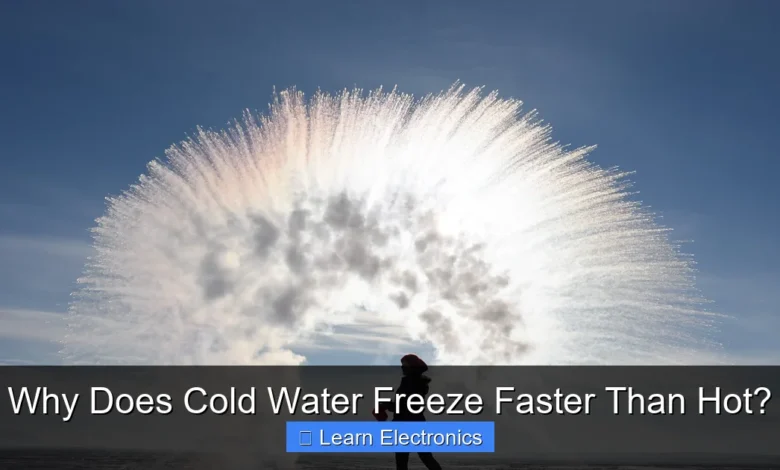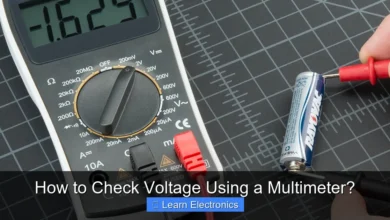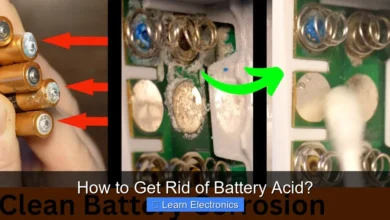Why Does Cold Water Freeze Faster Than Hot?

Why Does Cold Water Freeze Faster Than Hot? is a phenomenon known as the Mpemba effect, where, under specific conditions, hot water can indeed freeze more rapidly than cold water. This counter-intuitive thermal paradox has puzzled scientists and laypersons alike for centuries, challenging conventional understanding of heat transfer. The underlying mechanisms behind this method involve a complex interplay of physical properties and environmental factors.
Quick Answers to Common Questions
Does cold water really always freeze faster than hot water?
Not always! While it might seem intuitive, sometimes hot water can actually freeze faster than cold water due to something called the Mpemba effect, which challenges the simple assumption “Why Does Cold Water Freeze Faster Than Hot?”.
What factors influence whether cold water freezes faster or slower than hot water?
Several factors are at play, including supercooling, convection currents, evaporation rates, and even dissolved gases, all of which contribute to the complex answer to “Why Does Cold Water Freeze Faster Than Hot?”.
Why is there so much debate and curiosity around water freezing times?
The counter-intuitive nature of the Mpemba effect—where hot water freezes faster—makes the question “Why Does Cold Water Freeze Faster Than Hot?” surprisingly complex and fascinating to scientists and curious minds alike.
📑 Table of Contents
- Unpacking the Paradox: Why Does Cold Water Freeze Faster Than Hot?
- Key Hypotheses Explaining the Phenomenon
- Experimental Conditions and Variables
- Practical Implications and Real-World Examples
- Debunking Misconceptions and Nuances in Water Freezing Dynamics
- Comparative Analysis: Water Temperature and Freezing Time
- Conclusion
Unpacking the Paradox: Why Does Cold Water Freeze Faster Than Hot?
The Mpemba effect is a fascinating thermal phenomenon where, under certain conditions, hotter water can freeze faster than colder water. This seemingly contradictory observation, named after Tanzanian student Erasto Mpemba who observed it in the 1960s while making ice cream, has roots in observations dating back to Aristotle. It challenges the fundamental assumption that for water to freeze, it must first cool to 0°C (32°F), and thus, colder water should naturally reach this point faster. However, the science behind this effect reveals a much more intricate process involving various physical principles.
Key Hypotheses Explaining the Phenomenon
While no single, universally accepted explanation fully accounts for the Mpemba effect in all scenarios, several prominent hypotheses contribute to our understanding of this intriguing thermal paradox. The precise conditions under which this phenomenon occurs are critical, and a combination of these factors is often at play.
Evaporation and Mass Loss
One leading theory suggests that hot water, having a higher evaporation rate, loses mass more quickly than cold water. As water evaporates, it carries away latent heat, effectively cooling the remaining mass. If enough water evaporates from the hotter sample, its overall volume decreases significantly. A smaller volume of water, even if starting at a higher initial temperature, requires less energy removal to reach the freezing point, potentially allowing it to freeze faster than a larger volume of cooler water.
Supercooling and Convection Currents
Supercooling is the process where a liquid cools below its freezing point without solidifying. Cold water is more prone to supercooling because it contains fewer dissolved gases or impurities that can act as nucleation sites for ice crystal formation. Hot water, on the other hand, often has fewer dissolved gases due to their lower solubility at higher temperatures. This reduction in dissolved gases might lead to less supercooling, allowing hot water to freeze closer to its true freezing point without delay. Furthermore, hot water exhibits more vigorous convection currents initially, which can distribute heat more efficiently and consistently throughout the liquid, promoting more uniform cooling until freezing begins.
Frost Formation and Insulation
When placed in a freezer, a container of cold water might cause the freezer’s cooling elements to form a layer of frost or ice beneath it more quickly than hot water. This layer of frost acts as an insulator, reducing the efficiency of heat transfer from the cold water container to the freezer environment. Conversely, a container of hot water might initially melt any existing frost beneath it, improving direct thermal contact with the cold freezer shelf, thereby facilitating faster heat loss and accelerating the cooling process for this approach.
Dissolved Gases and Their Influence
As mentioned, hot water typically contains fewer dissolved gases (like oxygen and nitrogen) compared to cold water. These dissolved gases can affect the specific heat capacity of water and its thermal conductivity. Their presence can also influence the formation of ice crystals. By reducing the concentration of these gases, hot water might alter its physical properties in a way that makes the freezing process more efficient. This practice highlights the subtle chemical nuances involved in the freezing behavior of water.
The Science Behind Why Hot Water Might Freeze First
The rate at which water cools depends significantly on the temperature difference between the water and its surroundings, known as Newton’s Law of Cooling. However, this law doesn’t fully account for the Mpemba effect. The key might lie in how these temperature differences interact with other factors like convection, evaporation, and the properties of the container. Hot water might maintain higher internal temperature gradients initially, driving more effective heat transfer from its bulk to the colder surroundings, especially through enhanced convective currents.
Experimental Conditions and Variables
The Mpemba effect is not a universal rule; its occurrence is highly dependent on a specific set of experimental conditions. Replicating the effect consistently requires careful control over various parameters, illustrating why this technique is so debated.
Initial Temperature Differences
The temperature difference between the hot and cold water samples is crucial. There needs to be a significant, but not extreme, difference for the effect to manifest. If the hot water is too hot, it might take too long to cool; if the difference is too small, the effect might not be noticeable.
Container Properties
The material, shape, and size of the container play a vital role. Containers with good thermal conductivity (e.g., metal) and those allowing for efficient surface area exposure for evaporation can enhance the effect. The type of container influences how heat is transferred from the water to its surroundings.
Freezer Environment
The temperature and air circulation within the freezer are significant. A consistent, very cold freezer with good air circulation can help facilitate the effect, particularly by promoting evaporation and efficient heat removal.
Water Volume and Purity
The volume of water is critical, as smaller volumes are generally more susceptible to the effect due to faster mass loss through evaporation. Water purity, including the concentration of dissolved minerals and gases, can also influence supercooling and nucleation rates, thus affecting the freezing process.
Practical Implications and Real-World Examples
While primarily a scientific curiosity, the Mpemba effect has potential, albeit limited, practical implications and can be observed in certain real-world scenarios, offering insights into thermal dynamics.
Ice Making
Some anecdotal evidence from commercial ice makers suggests that starting with warmer water can occasionally lead to clearer, faster-forming ice cubes. This particular approach might be related to the removal of dissolved gases during heating, which reduces trapped air bubbles in the ice.
Cooling Systems
In certain industrial cooling applications or heat exchangers, understanding the nuances of how liquids cool, including non-linear behaviors like the Mpemba effect, could theoretically inform more efficient design or operational strategies. However, direct application is rare due to the specific conditions required for the effect.
Culinary Applications
Beyond ice cream making, chefs or home cooks might observe aspects of this phenomenon when rapidly chilling liquids for recipes. While not a universally reliable method for faster chilling, awareness of how initial temperature and container properties affect cooling rates can be beneficial in some culinary processes.
Debunking Misconceptions and Nuances in Water Freezing Dynamics
Despite its intriguing nature, it’s important to approach the Mpemba effect with a nuanced understanding, as it’s often misunderstood or oversimplified. This process is not a universal law.
Not Always True
The most significant misconception is that hot water always freezes faster than cold water. This is incorrect. The Mpemba effect is highly conditional and does not occur reliably in all circumstances. In many common situations, cold water will indeed freeze faster, as one would intuitively expect.
The Role of Specific Conditions
The effect relies on a precise combination of factors: initial temperatures, container characteristics, freezer conditions, water volume, and purity. Altering any of these variables can negate the effect entirely. Scientists are still working to fully map out all the necessary conditions for its consistent observation, making this approach a subject of ongoing research.
Comparative Analysis: Water Temperature and Freezing Time
To better understand the conditions that contribute to the Mpemba effect versus standard freezing behavior, let’s consider a comparative analysis. This table outlines hypothetical scenarios and expected outcomes under different conditions, emphasizing why careful experimental control is paramount for this technique.
Factors Influencing Freezing Time
The table below illustrates how different factors can impact the freezing time for both hot and cold water samples, highlighting the complexities that give rise to phenomena like the Mpemba effect.
| Factor | Cold Water (4°C) | Hot Water (70°C) | Impact on Mpemba Effect Likelihood |
|---|---|---|---|
| Evaporation Rate | Low | High | Favors hot water freezing faster (volume reduction) |
| Dissolved Gases | High | Low | Favors hot water (fewer nucleation sites, less supercooling) |
| Convection Currents | Weaker | Stronger (initially) | Favors hot water (efficient heat transfer) |
| Supercooling Tendency | Higher | Lower | Favors hot water (less delay before freezing) |
| Frost Formation Below Container | More likely to insulate | Less likely (melts existing frost, better contact) | Favors hot water (better thermal contact with freezer) |
| Container Material (e.g., metal) | Good conduction helps | Good conduction helps even more (initial rapid heat loss) | Enhances effect for hot water |
| Water Volume | Larger volume slows | Smaller volume speeds (due to evaporation effect) | Enhances effect for hot water in smaller volumes |
The table clearly shows that while cold water generally has less heat to lose, several factors can conspire to give hot water an advantage in the race to freeze. These dynamics underscore the non-linear nature of heat transfer in water.
Conclusion
The question of why hot water freezes faster than cold, known as the Mpemba effect, remains a captivating anomaly in thermal physics. It defies simple intuition, revealing the intricate and often counter-intuitive ways that heat transfer, phase changes, and the properties of water interact. While no single theory offers a complete explanation, the combined effects of evaporation, supercooling, convection currents, dissolved gases, and frost formation likely contribute to this fascinating phenomenon. The Mpemba effect serves as a powerful reminder that the world around us holds many scientific puzzles yet to be fully unraveled, encouraging continuous inquiry and a deeper appreciation for the complexities of everyday occurrences like water freezing.
Frequently Asked Questions
Is it always true that cold water freezes faster than hot water?
Generally, yes, cold water will freeze faster than hot water when both are placed in identical freezing conditions. This is the more common and reliable outcome you would observe in most situations.
Why does cold water have an advantage in freezing time?
Cold water simply has less heat energy to lose to reach its freezing point compared to hot water. It starts at a lower temperature, meaning it requires less time and less energy transfer to cool down to 0°C and solidify into ice.
What scientific principles explain why cold water freezes faster?
The primary principle is basic thermodynamics: a substance closer to its phase change temperature will reach that point quicker. Cold water’s closer proximity to 0°C means it requires a smaller temperature drop and less heat dissipation for it to freeze.
If I want ice quickly, should I always use cold tap water?
Yes, if your goal is to make ice as quickly and reliably as possible, using cold tap water is the recommended approach. While the “Mpemba effect” suggests hot water can sometimes freeze faster under very specific conditions, these are not consistently reproducible in everyday ice-making.
Does the container type affect why cold water freezes faster?
While the container type (e.g., material, shape) influences the overall rate of heat transfer and thus the total freezing time for both hot and cold water, it doesn’t change *why* cold water freezes faster. Regardless of the container, cold water will still have a head start due to its lower initial temperature.
As an Amazon Associate, I earn commission from qualifying purchases.



